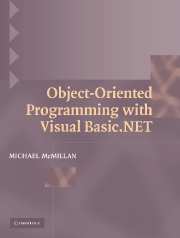Book contents
- Frontmatter
- Contents
- Preface
- Chapter 1 An Overview of the Visual Basic.NET Language
- Chapter 2 An Overview of Object-Oriented Programming
- Chapter 3 Structures
- Chapter 4 Classes
- Chapter 5 Access Modifiers
- Chapter 6 Abstract Classes and Interfaces
- Chapter 7 Implementing the IEnumerable and IComparable Interfaces
- Chapter 8 Designing and Implementing Exception Classes
- Chapter 9 Design Patterns and Refactoring
- Chapter 10 Object Internals: Reflection and Attributes
- Chapter 11 Object Persistence: Serialization
- Chapter 12 Building a Windows Application
- Chapter 13 Database Programming Using ADO.NET
- References
- Index
Chapter 4 - Classes
Published online by Cambridge University Press: 06 July 2010
- Frontmatter
- Contents
- Preface
- Chapter 1 An Overview of the Visual Basic.NET Language
- Chapter 2 An Overview of Object-Oriented Programming
- Chapter 3 Structures
- Chapter 4 Classes
- Chapter 5 Access Modifiers
- Chapter 6 Abstract Classes and Interfaces
- Chapter 7 Implementing the IEnumerable and IComparable Interfaces
- Chapter 8 Designing and Implementing Exception Classes
- Chapter 9 Design Patterns and Refactoring
- Chapter 10 Object Internals: Reflection and Attributes
- Chapter 11 Object Persistence: Serialization
- Chapter 12 Building a Windows Application
- Chapter 13 Database Programming Using ADO.NET
- References
- Index
Summary
This chapter introduces the class, the primary means of implementing OOP in VB.NET. The class framework provides the programmer with many techniques for exploiting the three main principles of OOP—encapsulation, inheritance, and polymorphism.
Classes are somewhat similar to structures in that they allow you to combine data members and methods in the same unit. Classes, though, are much more powerful than structures because they have many more tools available to them. These tools include constructor methods for creating new objects and the capabilities of having multiple methods with the same name and inheriting the definition of one class in another class.
This chapter begins with an overview of class construction, followed by the step-by-step creation of a class, and finally ending with several more examples of creating and using classes. The next few chapters in the book will explore many of the topics we introduce in this chapter.
BUILDING A CLASS
Class construction follows naturally from a well-designed ADT. There are some modifications we'll have to make to our ADT design to incorporate some concepts found in classes but not in structures. Still, a complete ADT makes building a class much easier than if you start from scratch.
The Class Heading
Like a structure, a class definition begins with its heading. The heading of a class consists of an access modifier, the reserved word Class, and a name for the class.
- Type
- Chapter
- Information
- Object-Oriented Programming with Visual Basic.NET , pp. 93 - 135Publisher: Cambridge University PressPrint publication year: 2004



